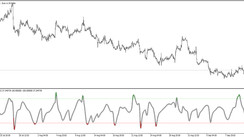Middle East Tensions Cause Rise in Oil Prices
Oil recorded an over 1% increase on Friday as more and more oil tankers changed direction away from the Red Sea. This rerouting happened in the wake of sea and air strikes by the US and UK on Houthi targets in Yemen, a response to the Iran-backed group's attacks on shipping vessels.
Brent crude futures experienced an increase of 90 cents, or 1.13%, standing at $78.31 per barrel at 12:11 p.m. ET (17:11 GMT). During the session, there was a climb of over $3 elevating it to more than $80. US West Texas Intermediate crude futures also rose by 88 cents, or 1.15%, to reach $72.85, marking a rise of over $3 during its highest session.
Impact of Saudi Arabia and Stock Upturn
For the week, both benchmarks were anticipating a decline due to Saudi Arabia's price reduction and an unexpected increase in U.S. crude reserves, triggering worries about supply. Dennis Kissler, the Senior Vice President of trading at BOK Financial, highlighted that the growing tensions in the Middle East were the primary concern now, possibly resulting in a $5-$7 a barrel premium on crude futures in the short run.
Tanker Companies Change Course, Tensions Escalate
Tanker companies, including Stena Bulk, Hafnia, and Torm, revealed their decisions to stop all ships heading to the Red Sea. These US and UK strikes were a response to Houthi assaults on commercial vessels in the Red Sea since October. The concern being that the war between Israel and Hamas could stretch to wider Middle Eastern conflicts, leading to oil supply disruptions.
Concerns about Potential Oil Market Reactions
This includes the significant Strait of Hormuz, located between Iran and Oman on the Arabian Peninsula's other side. Iranian authorities seized a tanker carrying Iraqi crude headed for Turkey south of this strait on Thursday. Matt Stephani, President at Cavanal Hill Investment Management, noted that the markets might react much more significantly if the conflicts were to extend to the Arabian peninsula's other side.





